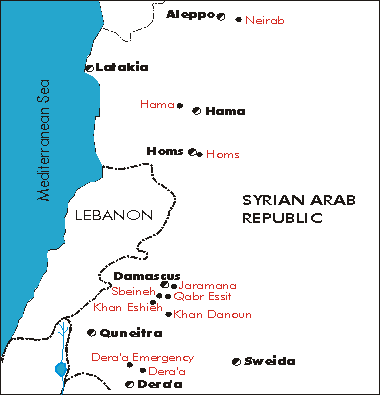UN Relief & Works Agency (UNRWA): Palestinian Refugees in Syria
(2021)
Even before the outbreak of the current conflict, in 2011, Palestine refugees in Syria were a vulnerable population. Although they had many of the rights of Syrian citizens - including access to social services provided by the Government of Syria - Palestine refugees lagged behind the host population in key development indicators. The community had higher rates of infant mortality and lower rates of school enrolment, for example, and their long-term future was uncertain.
Palestine refugees have also been vulnerable to the ongoing conflict, as violence has increasingly enroached upon the Palestine refugee camps. Many have been displaced within Syria, while thousands of others have fled to neighbouring countries, including Lebanon and Jordan. The situation remains volatile, with numbers and needs constantly changing, but despite the many challenges, UNRWA is continuing its emergency relief, health and education services in Syria. In Lebanon and Jordan, the Agency is also trying to provide for the needs of those fleeing the conflict.
Before the conflict broke out, the UNRWA situation in Syria was very different:
Most of the Palestine refugees who fled to the Syrian Arab Republic in 1948 were from the northern part of Palestine, mainly from Safad and the cities of Haifa and Jaffa. A further 100,000 people, including Palestine refugees, fled from the Golan Heights to other parts of Syria when the area was occupied by Israel. A few thousand refugees fleeing war-torn Lebanon in 1982 also took refuge in Syria. UNRWA works closely with the General Administration for Palestine Arab Refugees (GAPAR), a department of the Ministry of Labour and Social Affairs, which was established in 1950, and has worked with other government departments to maintain its services for Palestine refugees.
Syria UNRWA Camps
|
These are 2018-2019 figures and most have changed during the civil war.
*Destroyed in the civil war.
**Includes surrounding area.
Facts and Figures
- 562,312 registered Palestine refugees
- Nine camps
- 103 schools
- 50,143 stsudents
- Damascus Training Centre
- 24 primary health centres
- 5 community rehabilitation centres
- 13 women's program centres
Education
UNRWA operates 103 double-shift schools and offers basic elementary and preparatory education to 50,143 Palestine refugee children. Schools follow the national curriculum of the Syrian Ministry of Education. UNRWA also operates a vocational training centre in Damascus which prepares young refugees for employment by equipping them with marketable skills.
Health
UNRWA has a network of 24 primary healthcare centres which offer, among other services, pre-natal care for expectant mothers and their babies. UNRWA also provides environmental health services in the camps.
Relief and social services
UNRWA’s wide range of social services target the most vulnerable refugees including young people, women, the elderly, people with disabilities and the very poor. As well as serving Palestinians, the programme also runs specific projects to improve living conditions in the camps and has extended services to Palestinians who fled the war in Iraq.
Microfinance and microenterprise
Since its establishment in Syria in 2003, the microfinance programme has provided loans to micro-entrepreneurs and others who wish to start small businesses but do not qualify for bank loans. Due to its success, this programme has expanded quickly and a new office was opened in Aleppo. This brings to five the number of microfinance offices in Syria.
Source: UNRWA



